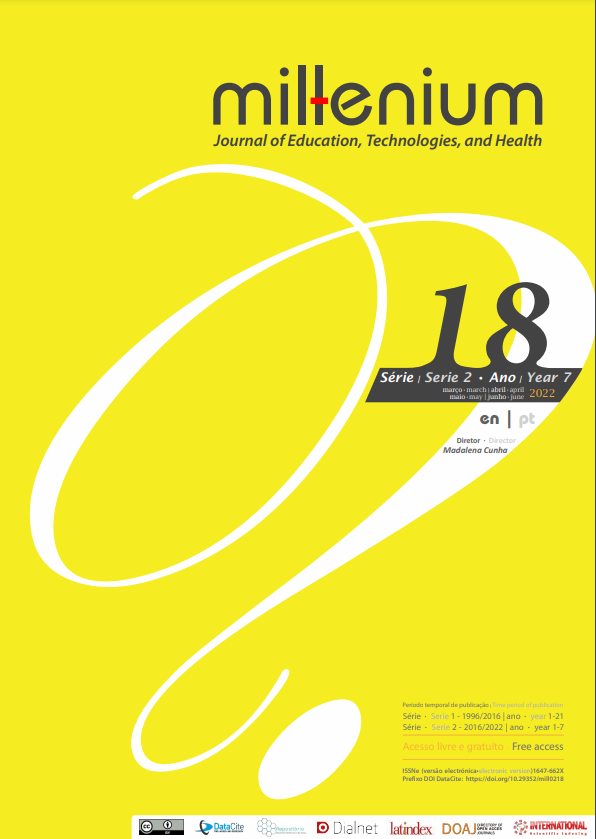Interventions in the person in palliative care with fatigue
a scoping revie
DOI:
https://doi.org/10.29352/mill0218.26430Keywords:
Palliative care., fatigue, nursingAbstract
Introduction: Fatigue is one of the most common symptoms in patients in palliative care that affects their quality of life and whose management remains a challenge.
Objective: To map the nursing interventions used to control fatigue in people in palliative situations.
Methods: Scoping Review according to the Joanna Briggs Institute methodology. Two independent researchers performed the analysis, extraction and synthesis of the results.
Results: Nursing interventions such as Psychosocial Intervention, Aromatic Massage, Standard Palliative Care, Online Collaborative Intervention, Cognitive Behavioural Therapy, Physical Exercise and acupuncture were identified.
Conclusion: The studies point to multidisciplinary multimodal interventions, where the nurse has a primary role. However, there are no studies in patients in a terminal phase of their disease, that is, in the last months or days of life, so further research is suggested on the effectiveness of interventions to control patient fatigue in palliative care and the adoption of strategies that improve the knowledge of health professionals about the impact of fatigue.
Downloads
References
Berger, A., et al. (2020). NCCN Clinical practice guidelines in Oncology. Cancer-related Fftigue. Version 1.2021. https://www.nccn.org/
Cheng, C., Chen, L., Ning, Z., Zhang, C., Chen, H., Chen, Z., Zhu, X., & Xie, J. (2017). Acupuncture for cancer-related fatigue in lung cancer patients: a randomized, double blind, placebo-controlled pilot trial. Supportive Care in Cancer, 25(12), 3807–3814. http://search.ebscohost.com/login.aspx?direct=true&db=ccm&AN=125895078&lang=pt-br&site=ehost-live
Ghoshal, A., Salins, N., Deodhar, J., Damani, A., & Muckaden, M. A. (2017). Impact of symptom control on fatigue improvement in patients with advanced cancer: A prospective observational study. Progress in Palliative Care, 25(2), 63–74. https://doi.org/10.1080/09699260.2016.1200818
Ingham, G., & Urban, K. (2020). How confident are we at assessing and managing fatigue in palliative care patients? A multicenter survey exploring the current attitudes of palliative care professionals. Palliative Medicine Reports, 1(1), 58–65. https://doi.org/10.1089/pmr.2020.0005
Klasson, C., Frankling, M. H., Hagelin, C. L., & Björkhem‐bergman, L. (2021). Fatigue in cancer patients in palliative care—a review on pharmacological interventions. Cancers, 13(5), 1–18. https://doi.org/10.3390/cancers13050985
Koesel, N., Tocchi, C., Burke, L., Yap, T., & Harrison, A. (2019). Symptom distress: Implementation of palliative care guidelines to improve pain, fatigue, and anxiety in patients with advanced cancer. Clinical Journal of Oncology Nursing, 23(2), 149–155. http://search.ebscohost.com/login.aspx?direct=true&db=mdc&AN=30880813&lang=pt-br&site=ehost-live
Miller, K. R., Patel, J. N., Symanowski, J. T., Edelen, C. A., & Walsh, D. (2019). Acupuncture for cancer pain and symptom management in a palliative medicine Clinic. American Journal of Hospice and Palliative Medicine, 36(4), 326–332. https://doi.org/10.1177/1049909118804464
Peters, M. D. J., Godfrey, C., McInerney, P., Munn, Z., Tricco, A. C. & Khalil, H. (2020). Chapter 11: Scoping Reviews. In: Aromataris E, Munn Z (Editors). JBI Manual for Evidence Synthesis. https://doi.org/10.46658/JBIMES-20-12
Poort, H., Peters, M., Bleijenberg, G., Gielissen, M. F., Goedendorp, M. M., Jacobsen, P., Verhagen, S., & Knoop, H. (2017). Psychosocial interventions for fatigue during cancer treatment with palliative intent. The Cochrane Database of Systematic Reviews, 7, CD012030. http://search.ebscohost.com/login.aspx?direct=true&db=mdc&AN=28708236&lang=pt-br&site=ehost-live
Poort, H., Peters, M. E. W. J., van der Graaf, W. T. A., Nieuwkerk, P. T., van de Wouw, A. J., Nijhuis-van der Sanden, M. W. G., Bleijenberg, G., Verhagen, C. A. H. H. V. M., & Knoop, H. (2020). Cognitive behavioral therapy or graded exercise therapy compared with usual care for severe fatigue in patients with advanced cancer during treatment: a randomized controlled trial. Annals of Oncology. Official Journal of the European Society for Medical Oncology, 31(1), 115–122. http://search.ebscohost.com/login.aspx?direct=true&db=mdc&AN=31912784&lang=pt-br&site=ehost-live
Radbruch, L., De Lima, L., Knaul, F., Wenk, R., Ali, Z., Bhatnaghar, S., Blanchard, C., Bruera, E., Buitrago, R., Burla, C., Callaway, M., Munyoro, E. C., Centeno, C., Cleary, J., Connor, S., Davaasuren, O., Downing, J., Foley, K., Goh, C., … & Pastrana, T. (2020). Redefining palliative care—A new consensus-based definition. Journal of Pain and Symptom Management, 60(4), 754– 764. https://doi.org/10.1016/j.jpainsymman.2020.04.027
Radbruch, L., Strasser, F., Elsner, F., Gonçalves, J. F., Løge, J., Kaasa, S., Nauck, F., & Stone, P. (2008). Fatigue in palliative care patients - An EAPC approach. Palliative Medicine, 22(1), 13–32. https://doi.org/10.1177/0269216307085183
Steel, J. L., Geller, D. A., Kim, K. H., Butterfield, L. H., Spring, M., Grady, J., Sun, W., Marsh, W., Antoni, M., Dew, M. A., Helgeson, V., Schulz, R., & Tsung, A. (2016). Web-based collaborative care intervention to manage cancer-related symptoms in the palliative care setting. Cancer, 122(8), 1270–1282. http://search.ebscohost.com/login.aspx?direct=true&db=mdc&AN=26970434&lang=pt-br&site=ehost-live
World Health Organization. (2002). WHO – Definition of palliative care. World Health Organization. http://www.who.int/cancer/palliative/definition/en/
Zuo, X. L., Wen, Y., Gong, S. Q., & Meng, F. J. (2019). Effectiveness of integrated nursing interventions for fatigue in patients with advanced cancer: A systematic review of randomized controlled trials. Frontiers of Nursing, 6(3), 203–210. https://www.scopus.com/inward/record.uri?eid=2-s2.0-85075195386&doi=10.2478%2FFON-2019- 0027&partnerID=40&md5=490956e09181ef419104429f9804b376
Downloads
Published
How to Cite
Issue
Section
License
Copyright (c) 2022 Millenium - Journal of Education, Technologies, and Health

This work is licensed under a Creative Commons Attribution 4.0 International License.
Authors who submit proposals for this journal agree to the following terms:
a) Articles are published under the Licença Creative Commons (CC BY 4.0), in full open-access, without any cost or fees of any kind to the author or the reader;
b) The authors retain copyright and grant the journal right of first publication, allowing the free sharing of work, provided it is correctly attributed the authorship and initial publication in this journal;
c) The authors are permitted to take on additional contracts separately for non-exclusive distribution of the version of the work published in this journal (eg, post it to an institutional repository or as a book), with an acknowledgment of its initial publication in this journal;
d) Authors are permitted and encouraged to publish and distribute their work online (eg, in institutional repositories or on their website) as it can lead to productive exchanges, as well as increase the impact and citation of published work
Documents required for submission
Article template (Editable format)





